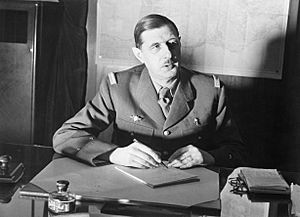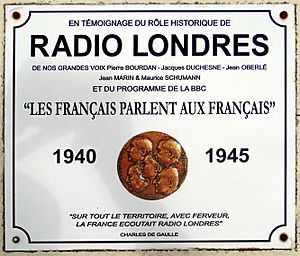Radio Londres facts for kids
|
|
|---|---|
| Broadcast area | France |
| Frequency | Constantly changing, broadcasting on mediumwave, longwave and shortwave |
| Programming | |
| Language(s) | French |
| Format | propaganda |
| Affiliations | French government in London, Special Operations Executive |
| Ownership | |
|
Sister stations
|
Radio Belgique |
| History | |
|
First air date
|
19 June 1940 – 25 October 1944 |
Radio Londres ([ʁa.djo lɔ̃dʁ], which means "Radio London" in French) was a special radio station. It broadcast from 1940 to 1944. The BBC in London sent its signals to France, which was occupied by Nazi Germany.
The station spoke only in French. It was run by the Free French, who were people who had escaped from occupied France. Radio Londres worked to fight against the messages from German-controlled Radio Paris. It also countered the Vichy government's Radiodiffusion Nationale. Most importantly, it encouraged French people to resist the occupation. It also sent secret messages to the French Resistance.
Why Was Radio Londres Created?
In 1940, the BBC opened its studios to French people who had fled the German occupation. This was the start of Radio Londres. For four years, it became a daily must-listen for many French people.
The station began its broadcasts with a famous line: "Ici Londres ! Les Français parlent aux Français..." This means "This is London! The French speaking to the French..." It was the voice of the Free French Forces, led by Charles de Gaulle. On June 18, 1940, De Gaulle made his famous Appeal of 18 June. He asked his fellow French citizens to resist and fight against the occupation.
Through these broadcasts from Britain, the French Resistance found a way to be heard in France. Radio Londres helped fight against the Nazi propaganda from stations like Radio Paris. The Germans quickly banned listening to Radio Londres because they knew it was hurting their control.
Radio Londres also encouraged people to resist the occupation. De Gaulle asked Parisians to clear the streets for an hour as a protest. The station also helped prepare for D-Day. It promoted the V for Victory campaign, where people drew a "V" on walls. This was a quiet way to show they were against the occupation.
Some young announcers made the broadcasts more lively. They used personal messages, funny skits, songs, and jokes. This was a new style compared to other formal French radio stations.
How Were Secret Messages Sent?

Georges Bégué, who worked for the Special Operations Executive (SOE), had a clever idea. He suggested sending strange-sounding personal messages to agents in the field. This helped reduce risky radio traffic.
Broadcasts would start with: "Before we begin, please listen to some personal messages." Everyone knew these were secret messages. They often sounded funny and made no sense to outsiders. For example, a message might be "Jean has a long moustache." Or, "There is a fire at the insurance agency." Each message had a special meaning for a specific resistance group.
These messages were mainly used to give instructions to the resistance. They also thanked agents or sometimes just confused the enemy. The messages were in code, not cipher. This meant the Germans could not understand them without a special codebook. So, they tried to jam the radio signals instead.
By early June 1944, the Allies sent many messages. On June 1 alone, over 200 messages were broadcast. This made it clear that something big was about to happen. Even with some German jamming, the famous first four notes of Beethoven's 5th Symphony could be heard. These notes sound like the dot-dot-dot-dash of the Morse code letter V for Victory.
Just before the D-Day landings on June 6, 1944, Radio Londres broadcast a special poem. It was the first part of "Chanson d'automne" by Paul Verlaine. The first line, Les sanglots longs des violons de l’automne, meant the invasion would start within 24 hours. The second line, Blessent mon cœur d'une langueur monotone, was the specific call for action.
By late 1944, the Allies had won in France. This meant Radio Londres had completed its mission and stopped broadcasting.
See also
- German occupation of France during World War II
- French Resistance
- Liberation of France
- Radio Belgique
- Radio Londra
- Verlaine Message Museum
 | Chris Smalls |
 | Fred Hampton |
 | Ralph Abernathy |


